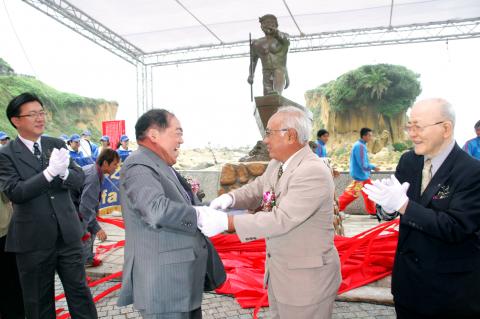Braving strong winds, rain and waves pounding the shore, officials and residents from Keelung and Japan’s Okinawa Prefecture yesterday jointly unveiled a statue of an Okinawan fisherman with cheers, music and words of friendship to commemorate Okinawans who died during the 228 Incident.
The ceremony started with a Buddhist rite, hosted by the head monk from Seikoji Temple in Okinawa, at Wanshantang — a small temple with urns containing bones and ashes of people of unknown identity or those who died without descendants — near the monument on Keelung’s Heping Island (和平島), which is just off Taiwan proper.
Bodies of Okinawan fishermen, including more than 30 of them who were killed by Chinese Nationalist Party (KMT) troops in the 228 Incident, were buried at Wanshantang.

Photo: Loa Iok-sin, Taipei Times
The 228 Incident refers to the large-scale uprising across the island in 1947 against the KMT regime, which was put down in a violent crackdown.
“We’ve always heard that some of our ancestors are here in Keelung and the people of the city have always remembered them in religious rites,” the monk said. “We’re holding a religious rite and have erected a monument here to comfort the spirits of our ancestors.”
“Meanwhile, we would also like to express our gratitude to the people of Keelung,” the monk added.
Chou Chen-tsai (周振才), a board member of the 228 Care Association, said that from about 1905 to the end of World War II, as many as 500 fishermen from Okinawa, whose former name was Ryukyu, had settled on Heping Island, forming a “Ryukyu village” there, and lived side by side with Taiwanese.
Many Okinawan fishermen stayed after the end of the war and some were killed during the massacre in 1947.
“That there were Okinawan victims of the 228 Incident are not known among the public, but we’ve always heard about it from locals. So, around eight years ago, organizations of the 228 Incident and historians launched a research project in both Taiwan and Okinawa and have confirmed it as fact,” Chou said.
“That’s why we’re erecting a monument here, not only to remember the deceased, but also to remind the public about the forgotten history,” Chou added.
The religious rite was followed by a ceremony to unveil the monument by Keelung Mayor Chang Tong-rong (張通榮) and Toshihiko Simoji, mayor of Miyakojima City in Okinawa Prefecture, where many of the Okinawan fishermen who settled on Heping Island came from.
The mayors thanked each other for their help in erecting the statue and expressed the hope that the monument would help to enhance exchanges between the two cities, which were quite frequent before 1945.
Many Okinawans whose ancestors had once lived on Heping Island also attended the ceremony — among them was Shiosei Yashumoto, whose great-uncle, Chouzou Uchima, lived on Heping Island from 1905 to 1945, and was the model for the fisherman statue.
“My great uncle lived in Taiwan from 1905 to 1945. He was a good friend of Taiwanese, he taught them some fishing techniques unique to Okinawa and gave his Taiwanese friends fish during wartime when the [Japanese colonial] government prohibited selling fish to the Taiwanese,” Yashumoto said through a translator. “He was even arrested for that, but he was released by arguing that he didn’t ‘sell’ the fish, rather, people took it from him for free.”

Alain Robert, known as the "French Spider-Man," praised Alex Honnold as exceptionally well-prepared after the US climber completed a free solo ascent of Taipei 101 yesterday. Robert said Honnold's ascent of the 508m-tall skyscraper in just more than one-and-a-half hours without using safety ropes or equipment was a remarkable achievement. "This is my life," he said in an interview conducted in French, adding that he liked the feeling of being "on the edge of danger." The 63-year-old Frenchman climbed Taipei 101 using ropes in December 2004, taking about four hours to reach the top. On a one-to-10 scale of difficulty, Robert said Taipei 101

Nipah virus infection is to be officially listed as a category 5 notifiable infectious disease in Taiwan in March, while clinical treatment guidelines are being formulated, the Centers for Disease Control (CDC) said yesterday. With Nipah infections being reported in other countries and considering its relatively high fatality rate, the centers on Jan. 16 announced that it would be listed as a notifiable infectious disease to bolster the nation’s systematic early warning system and increase public awareness, the CDC said. Bangladesh reported four fatal cases last year in separate districts, with three linked to raw date palm sap consumption, CDC Epidemic Intelligence

Taiwanese and US defense groups are collaborating to introduce deployable, semi-autonomous manufacturing systems for drones and components in a boost to the nation’s supply chain resilience. Taiwan’s G-Tech Optroelectronics Corp subsidiary GTOC and the US’ Aerkomm Inc on Friday announced an agreement with fellow US-based Firestorm Lab to adopt the latter’s xCell, a technology featuring 3D printers fitted in 6.1m container units. The systems enable aerial platforms and parts to be produced in high volumes from dispersed nodes capable of rapid redeployment, to minimize the risk of enemy strikes and to meet field requirements, they said. Firestorm chief technology officer Ian Muceus said

MORE FALL: An investigation into one of Xi’s key cronies, part of a broader ‘anti-corruption’ drive, indicates that he might have a deep distrust in the military, an expert said China’s latest military purge underscores systemic risks in its shift from collective leadership to sole rule under Chinese President Xi Jinping (習近平), and could disrupt its chain of command and military capabilities, a national security official said yesterday. If decisionmaking within the Chinese Communist Party has become “irrational” under one-man rule, the Taiwan Strait and the regional situation must be approached with extreme caution, given unforeseen risks, they added. The anonymous official made the remarks as China’s Central Military Commission Vice Chairman Zhang Youxia (張又俠) and Joint Staff Department Chief of Staff Liu Zhenli (劉振立) were reportedly being investigated for suspected “serious